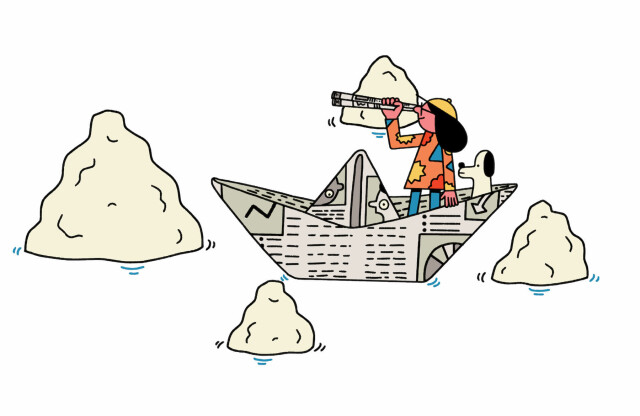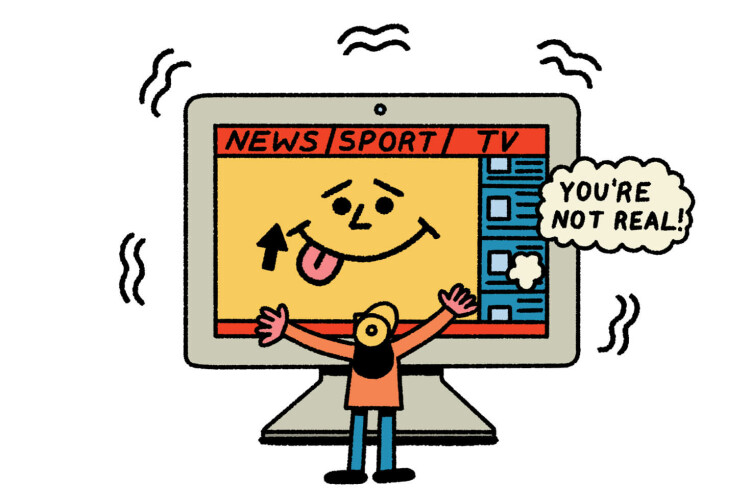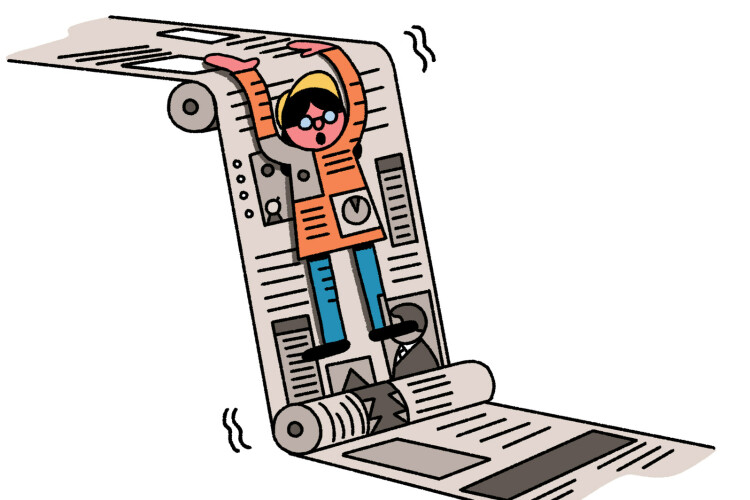Algorithm
A step-by-step set of instructions or ‘formula’ for solving a problem.
Balance
Giving both sides of an argument in a fair way so that your audience / readers can make up their own mind.
Bias
Where a news report is slanted (or unbalanced) to make one side of the story seem more important.
Breaking news
Reports of events that have just happened and are coming in while a newspaper or broadcast is in production.
Byline
The name of the person who wrote the report.
Caption
A brief description of a photograph.
Chief editor/editor-in-chief
The leader of the news organisation, in charge of the overall strategy of the paper and the values it stands for.
Closed question
A question which gets a short answer (normally ‘yes’ or ‘no’), or where there is only one possible answer.
Concise
Short and clear.
Desk editor
The person in charge of a specific section (news desk) eg: national, international, sport, science. Makes decisions about what stories to cover in their section and approves reports before sending them to the subeditors.
Direct speech
The actual words of the speaker.
Fact
Something that is true and definitely known about a situation. Fact is supported by evidence.
Fake news
News which is not true, or does not include all of the facts.
Fiction
A story that comes from the writer’s imagination eg a novel. Related words: fictional, fictitious.
Filter bubble
When someone only sees information that they already agree with or like. Filter bubbles can be caused by algorithms that predict what someone will be interested in.
Headline
A phrase that summarises the main point of the article. Headlines are in large print and aim to catch the attention of the reader.
Hoax
A trick, designed to fool people.
International news
News stories that are happening around the world (outside your home country).
Interview
A structured set of questions (planned in advance) that you ask a guest.
Interviewee
The person being interviewed.
Journalist
Someone who produces news reports. May be a reporter or an editor.
Local news
News stories that are happening near to where you live, in your village, town or community.
National news
News stories that are happening in your home country.
News
Information which the audience / reader either needs to know or wants to know.
Newsworthy
A story that is important or interesting enough to be reported.
Open question
A question where there could be lots of possible ways to answer and which is likely to receive a longer answer than just ‘yes’ or ‘no’.
Opinion
1. A person’s view or idea about a situation.
2. A type of writing in a news publication that includes what the writer thinks about a situation, rather than just the facts.
Page furniture
Everything on a news page that isn’t the report or photos, eg headlines, captions.
Parody
A funny, exaggerated version of something designed to make people laugh.
Picture editor
The person who chooses which pictures to use with a story.
Press conference
When reporters are gathered together in one place to question someone in the news, usually taking it in turns to ask questions.
Point of view/perspective
What an individual person thinks or feels about something.
Redundant
Not needed or no longer needed.
Regulated (news)
Controlled with rules and regulations, ensuring news organisations uphold high standards of journalism. Newspaper regulators in the UK include the Independent Press Standards Organisation (Ipso) and Impress. The broadcast regulator is Ofcom.
Reported speech
A speaker’s words paraphrased by a reporter, eg ‘He said that he was happy’.
Reporter
The person who researches and writes the news story.
Rumour
A story about a situation that has not been proven, is not supported by facts and may not be true. Each time it is repeated it can change, until you cannot be sure what is true.
Social media
Websites and apps which enable users to create and share content or to speak to people online (eg Twitter, Instagram, Snapchat, Facebook).
Source
Where a news story has come from. For example, a source could be an official report, a tweet, a press conference, a named person or an unnamed (anonymous) person such as ‘an insider’ or ‘a neighbour’.
Speculation
A guess or ‘inference’ about what has happened. Anyone can speculate about a situation, even if they weren’t there or the event hasn’t happened yet.
Standfirst
Words linking the headline to the story. The standfirst is in smaller print than the headline but larger print than the story.
Subeditor
The person who reads a news report (which has been written by someone else) and corrects mistakes. They also double-check the facts, and write headlines and captions.
Trustworthy
Something that you can believe is real or reliable.
Value
A set of agreed standards that a news organisation aims to meet in everything they do. NewsWise aims to uphold the highest standards of journalism through four key values: truthful, fair, balanced and interesting.



